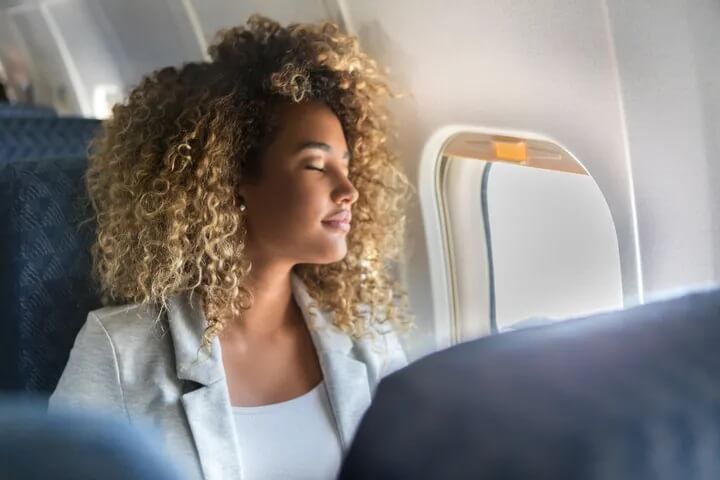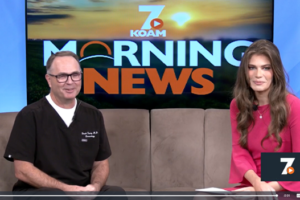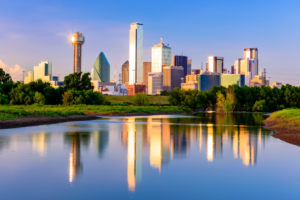Read Full Article HereWhy You Need To Be Extra Careful If You’re Sitting In A Window Seat On A Plane
There can be a higher risk of premature aging and even skin cancer.
By Jillian Wilson
Earlier this year, TikTok user FindingFiona uploaded a travel video that got serious attention, garnering more than 2 million views and 1,000 comments. In the post, she emphasized the importance of wearing sunscreen on flights, citing reports of people incurring more sun damage when they’re at higher altitudes.
“Even though you’re inside the aircraft, because of the high altitudes, you’re actually experiencing stronger UV radiation, especially if you’re in the window seat,” she says in the video.
According to dermatologists, the TikToker’s claim is partially correct — but it’s also a little wrong. “The good news is that the true risk from one flight, or somebody who flies occasionally, is probably low,” said Dr. Elizabeth Jones, an assistant professor of dermatology at Thomas Jefferson University Hospital in Philadelphia.
But Jones noted that for flight crew members and pilots, the risk is higher. “People who are flying occupationally, they’re going to be exposed much more to ultraviolet light given — especially, if they’re in the cockpit — the size of the windshield,” and given all the time they spend at a higher altitude, she said.
Jones pointed to a 2015 study that found pilots and cabin crew have roughly twice the incidence of melanoma, a less common but more serious form of skin cancer, when compared to the general population.
So, there is a connection between flying and sun damage. Below, dermatologists explain what you should know about your sun damage risk when you’re at cruising altitude.
Airplane windows block out most UVB rays, but not all UVA rays.
“Airplane windows effectively block out most of the UVB rays,” Jones said, referring to the rays that can cause sunburn and skin cancer. So even if you’re sitting in the window seat, you likely won’t end up with sunburn after a flight. But that doesn’t mean other damage can’t occur.
This is also true for non-airplane windows, said Dr. Jennifer Holman, a dermatologist with U.S. Dermatology Partners Tyler in Texas. “Most typical windows in a house or a car are going to filter out … like 97%, 98% of the UVB radiation, which is typically the wavelength that people think of that causes sunburns,” she said.
While windows block these rays, they don’t block all rays. According to Jones, airplane windows don’t fully keep out UVA rays, which can “cause premature aging, wrinkles and ultimately can contribute to skin cancer as well.” (Jones did note, however, that “some of the older windows block out about 50% of UVA rays” and “some of the newer models are more effective at even blocking out UVA.”)
Again, this goes beyond airplanes: Holman said most glass windows, including your car windows and the windows at your local coffee shop, also don’t offer UVA protection. In general, “most glass does not filter out UVA,” she noted.
Wearing sunscreen on a plane can protect you from these harmful rays, which Holman said penetrate “more deeply into the skin” and put you “at risk for different types of skin cancer, including the most deadly form of skin cancer, melanoma.”
So, who needs sunscreen on an airplane?
The short answer: everyone.
Sunscreen is important for folks to wear daily, whether or not you’re taking a flight. “As a dermatologist, of course, I’m encouraging all of my patients to wear their sunscreen as a daily habit every day, just for the exposures that we face and the free radicals that are out in the world from UV radiation,” Holman said.
While it is important for everyone to wear sunscreen on a plane, Jones said certain people should take particular caution.
“Who should consider wearing sunscreen on a plane?” she said. “Certainly, someone with a personal or family history of skin cancer may want to get that added protection by using a sunscreen.”
Folks with fair skin who are more sensitive to the sun should consider that added protection, too. The same goes for people with medical conditions that make them susceptible to sun damage, and people who are on medication that increases sun sensitivity, Jones noted.
Holman said that when shopping for sunscreen, you should find one that’s labeled “broad-spectrum,” meaning it protects against both UVA and UVB rays. This is always necessary, including on a plane when you aren’t protected from that UVA light.
Beyond sunscreen, Holman stressed that other protections are also helpful. “The importance of physical protection, too ― wearing hats, sun protective clothing, sunglasses ― all those things continue to be important as we’re protecting ourselves from ultraviolet exposure,” she said.
Why You Need To Be Extra Careful If You’re Sitting In A Window Seat On A Plane
July 5, 2023








